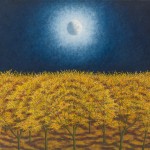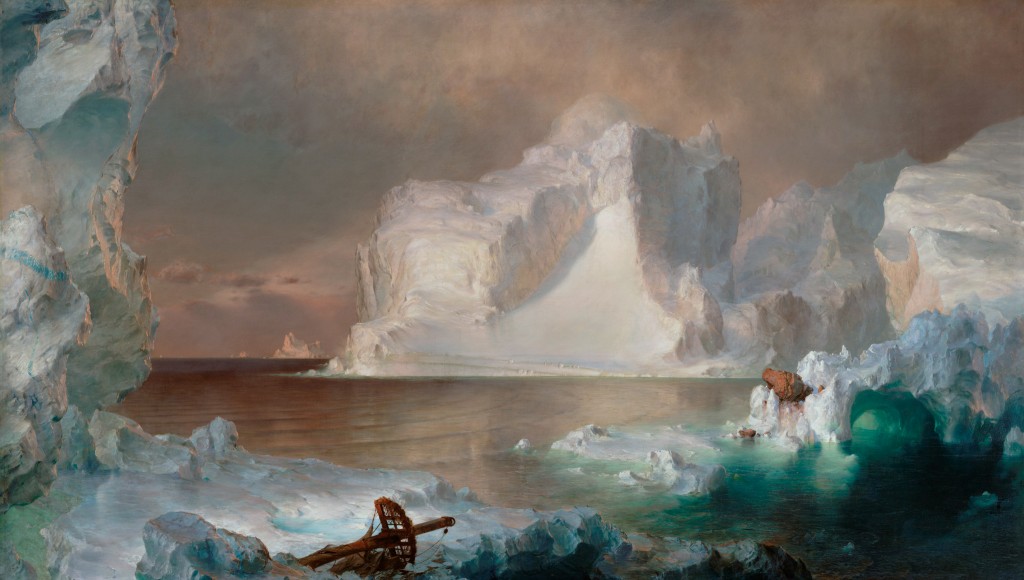
Autumn Moon (Luna de otoño), Scott Kahn
I first learnt about Ēriks Ešenvalds (b. 1977) in May 2014, while I was in Riga in order to get some navigational certificates which, a couple of weeks later, would allow me to sail around the Arctic on board the M/V Plancius, a vessel where I spent four months working for the Dutch company Oceanwide Expeditions. In my spare time in Riga, I took the chance to walk around the city trying to find out about some living Latvian composers. In order to do that, I visited different places, among them the Jāzeps Vītols Latvian Academy of Music and I also asked people on the streets. Finally, I ended up in a music shop, apparently the only shop you can find scores of Latvian composers in Riga: Musica Baltica. There I aksed one of the shop assistants if she could give me the name of some relevant living Latvian composers. Very kindly, she gave me three names: Peteris Vasks (I had already heard of him before flying to Latvia and I had also listen to some of his music), Ēriks Ešenvalds and Rihards Dubra. I asked her if it would be possible to get their email addresses, because I wanted to get in touch with them. In the end and after some complications, I managed to meet Rihards Dubra, a person whom I have very good memories and someone I hope to meet again someday, somewhere. I could not make it to meet Ēriks Ešenvalds. By the time I got an email from Ēriks explaining that he had no time for a meeting, I had already left Latvia. And that was it!
Months went by. I spent four months around the Arctic working for Oceanwide Expeditions and I came back to Madrid by the end of September. Time kept passing until mid January 2015, when I received an email from Ēriks Ešenvalds, around eight months after our first contact. In his email, he told me about the imminent launching of Northern Lights, his latest work for Hyperion Records. Yesterday, first of February 2015, I downloaded his work from iTunes and I spent my Sunday afternoon listening to it -I am also listening to his music while I am writing these words now.
In the last couple of year, as if by magic, life has presented me with situations where I started connecting dots. Having the chance to witness the formation of the Northern Lights over my time around the Arctic on board the del M/V Plancius, Ēriks Ešenvalds’ latest work takes on a special meaning to me. One of the first persons who came to my mind while I was listening to Northern Lights was Henk Strietman, whom I met during those Arctic months. I remember having very interesting conversations with him about life, music and the Arctic. It was thanks to him that I learnt about some composers and their music, a completely new world for me. Among others And God created the great whales by Alan Hohvaness (1911-2000), Canto Ostinato by Simeon ten Holt (1923-2012).
Northern Lights was recorded at both the Trinity College Chapel and the Ely Cathedral. The music has been performed by the Trinity College Choir conducted by Stephen Layton. The album consists of 16 songs for choir and some peculiar instruments such as harp, organ, brass, percussion, glass and chimes… The songs are based on different texts in different languages: Latin, English, Sami and Latvian. If I am writing about these works now, it is because I consider they are beautiful choral music which, in my opinion, will stand the test of time.

The Icebergs, Frederic Edwin Church, 1861.
The first track, O salutaris hostia, may be the most popular work among Ešenvalds’. It is based on a Latin text from an antiphon for the feast of Corpus Christi. O salutaris hostia is a meditative song with beautiful diatonic melodies for two sopranos hovering over the whispering and sublime voices of the choir. You cannot remain indifferent before such peaceful harmonies, emotional, spiritual, simply beautiful. The New Moon is the second track of the album and it is based on a poem by the troubled and tragic American poet Sara Teasdale (1884-1933) who died by her own hand in 1933. You can hear the sound of wine glasses and chimes which create an other-worldly atmosphere behind the quiet singing of the choir. Psalm 67 starts with a plain chant for baritone followed by the choir. Trinity Te Deum starts with a powerful introduction by the brass ensemble and the percussion in the style of a fanfare followed by the choir and the organ, a kind of hymn embellished by the sound of the harp in some passages. Northern Lights starts with a quiet unison by the choir followed by the singing of a tenor voice in the style of plain chant and again surrounded by the mystical sound of wine glasses evoking the tantalizing Northern Lights. The text is divided into three parts: the intro in Latvian and based on a Latvian folk song, the second part is based on a text by the American Arctic explorer Charles Francis Hall (1821-1871) who was poisoned by one of his crew members during the Polaris Expedition; the third part is based on a text of another Arctic explorer, the Norwegian Fridtjof Nansen (1861-1930), who was awarded the Peace Nobel Prize in 1922. This is the work which gives the name to the album. There must be a reason for it!! It is followed by The Heavens’ Flock, based on a poem by Paulann Petersen (b. 1942), The Early Rose, a choral singing acompanied by harp and based on a text by the Australian poet Emma Jones (b. 1977), Merton College Service, based on Latin texts from Luke’s gospel, Rivers of light, which starts with a text in Sami in the style of a folk song, Ubi Caritas, based on a Latin antiphon for Maundy Thursday, Amazing Grace, based on the well-known hymn by John Newton (1725-1807), O Emmanuel, a work for choir and mezzosoprano with a Latin text from an antiphon for 23 December, Who can sail without the wind? an English text based on the Swedish folk song Vem kan segla förutan vind?, Stars based on a another poem by Sara Teasdale and, finally, Only in Sleep, also based on poem by Sara Teasdale, a perfect end for this album.
I enourage anybody who is reading these words to listen to Northern Lights. You will not remain indifferent. It is beautifuf music, simple, full of emotions and spirituality. And for those of you who have never seen the actual Northern Lights, maybe the music of Ēriks Ešenvalds helps you to be transported to a world you will fully understand if you ever look at the sky and start connecting the dots. And this leads me to the following question: what makes us connect the dots?
Michael Thallium
Global & Greatness Coach
Book your coaching here
You can also find me and connect with me on:
Facebook Michael Thallium and Twitter Michael Thallium
